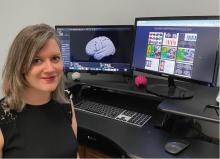Motor problems in children may be a harbinger of serious mental illness, new research suggests.
Investigators found that motor abnormalities were twice as common among those who develop psychosis or depression, compared with their counterparts in the general population, suggesting that these abnormalities may help predict vulnerability and provide an opportunity for early intervention.
“We have learned there are motor signs that are measurable in adolescence [that are] more prevalent in these disorders,” said lead investigator Katherine S. F. Damme, PhD, adolescent development and preventive treatment program (ADAPT), Northwestern University, Chicago.
“This is just scratching the surface of motor signs, but they may have some transdiagnostic vulnerability across these psychopathologies” to which sensorimotor connectivity and motor behaviors “might provide additional insight,” Dr. Damme added.
The findings were presented at the Virtual Congress of the Schizophrenia International Research Society 2021.
A core symptom
There has been a lot of interest in the pathophysiology of psychosis and in detecting it early, said Dr. Damme. “It has devastating effects, and early intervention is of great importance,” she added.
However, previous research has typically focused on affect or cognition, rather than on motor signs, despite the fact that motor signs are a “core symptom of both psychosis and depression.”
The prevalence and presentation of motor signs in adolescence, which is a “critical time for identifying these risk markers” because of their proximity to the onset of psychosis, has been understudied, Dr. Damme said.
For their study, the investigators gathered motor function data from the Adolescent Brain Cognitive Development Study (ABCD), which included 10,835 children aged 9-11 years with broad demographic diversity from 21 sites across the United States.
Overall, 27.6% of the children were reported to have least one motor sign; approximately 3% were reported to have two or more motor signs.
The most common of these was dyscoordination, which was endorsed by 19.3% of participants. In addition, 8.8% were reported to have had experienced developmental motor delays, 1.5% had psychomotor agitation, and 0.3% had psychomotor retardation.
The investigators determined that 4.6% of participants met criteria for depression, 2.6% for a psychosis, and 1.8% for comorbid psychosis and depression.
Motor signs were much more common among children with depression, psychosis, or both than among those who did not have these conditions; 45.8% reported having at least one motor sign.
Developmental motor delays and dyscoordination occurred at about the same rate in both patients with depression and those with psychosis. Rates were higher among patients with both of these conditions than among those with either condition alone.
In contrast, psychomotor agitation was more common among patients with depression alone and among those with comorbid depression and psychosis than among patients with psychosis alone. The rate of psychomotor retardation was increased among patients with psychosis alone but was less common among patients with comorbidity than in the healthy control group.
Familial vulnerability
The investigators also assessed participants who had not been diagnosed with a mental illness but who had a family history of depression only (28.9%), a relative with psychosis-like experiences (0.6%), or a family history of both depression and psychosis experiences (1.8%).


